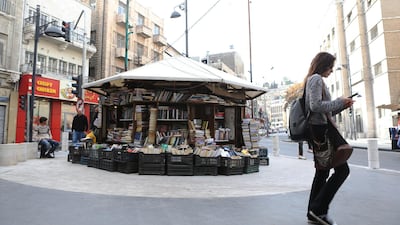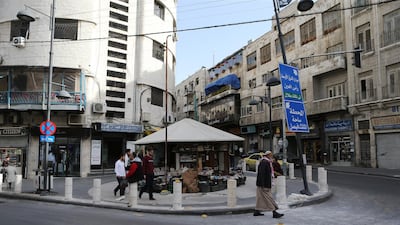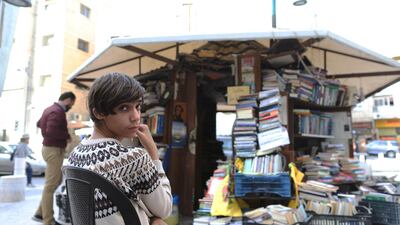Book lovers in Jordan are mourning the death of Hisham Maaytah, whose shop in downtown Amman was a magnet for readers of all ages and from all walks of life.
Maaytah died in a car accident on Saturday at the age of 48, just weeks after a fire at his warehouse near the shop destroyed part of the stock.
Maaytah's shop, Khazanat Al Jahith, a kiosk in downtown Amman, attracted intellectuals, writers, poets, lawyers, teachers and students. Customers described him as well-read, intelligent and always willing to engage in discussions about books.
“I used to find all the books that I wanted at his place,” said Hana Srahan, 58, a retired school counsellor. “He would often suggest titles for me to read based on my interest in psychology. He was very passionate about books, and I used to benefit from his advice.”
“Whenever I used to go downtown, I used to stop by his kiosk because he had rare books," said Ali Bitar, 49, a lawyer. “When I needed ones on Egyptian law, I could only find them at his place. And if he didn’t have what I wanted, he made sure to provide it. With his death, it will not the same.”
Raya Swalaha, a high school student, recalled the last time she talked to Maaytah three years ago.
“He was such a simple and a very intelligent man," she said "He was so down to earth and he would leave everyone and sit on the edge of the street so we could talk."
Jordan's King Abdullah visited Maaytah's wake and offered his condolences to the family, while fans of the bookseller posted tributes on social media.
Abdul Majeed Majali wrote on Facebook that Maaytah was the only bookshop owner who read all his books.
“You were perhaps the only one who adopted the slogan 'the goal is to read'. And money was the least of your concerns,” he said.
“May his soul rest in peace. He was very educated. He has never chosen a book for me that wasn’t great,” wrote Lean AlKhatib.
Maaytah's family opened Khazanat Al Jahith in the southern city of Karak in 1910 before relocating to Jerusalem and then Amman in the 1950s.
When Maaytah took over running the shop after his father's death in 1993, he continued its book swap scheme. In the late 1990s the fee was just one dinar (Dh5) to encourage reading in a country where books are costly for ordinary Jordanians.
“I call on Jordanian citizens, intellectuals and writers to come and exchange books,” he said during a TV appearance last month to talk about the history of his shop. “I do not ask for financial aid. I am asking that they come and exchange books.”
Maaytah's death "is a loss to Jordan", his brother Mohammed, 38, told The National. "People love to read, but books are expensive, so his initiative continued promoting the swapping of books and made them available to a large segment of society."
Mohammed said the 24-hour bookshop, which he will now run together with Maaytah's 20-year-old son Saher, served as a “pilgrimage for those seeking knowledge”.
The shop's stock includes old books and periodicals published in Jerusalem in the late 1800s. Among these are copies of Arabic literary journals such as An-nafais al-Assriah, which was published in Palestine under Ottoman rule and the British Mandate. There are also old magazines published in Egypt, religious and scientific books about Arab achievements as well as documents dating back to the Ottoman era.
“We try to preserve this content so that it can serve as a heritage for generations,” said Mohammed.
However, at least 10,000 books, 3,000 copies of the Quran and Ottoman periodicals were destroyed in the recent fire at the warehouse.
Hamzeh Akalyleh, 33, a journalist and a friend of Maaytah, was with him just a few hours before his death.
“Amman has lost one of the most important intellectuals,” he said. “Hisham was a simple and cultured man. His bookshop was a meeting point for political and social discussions. I have lost a dear friend I used to see daily after work. He encouraged me to finish writing a novel I was working on and asked me to organise a trip in Jordan. I promised him I would, but now it is too late.”






